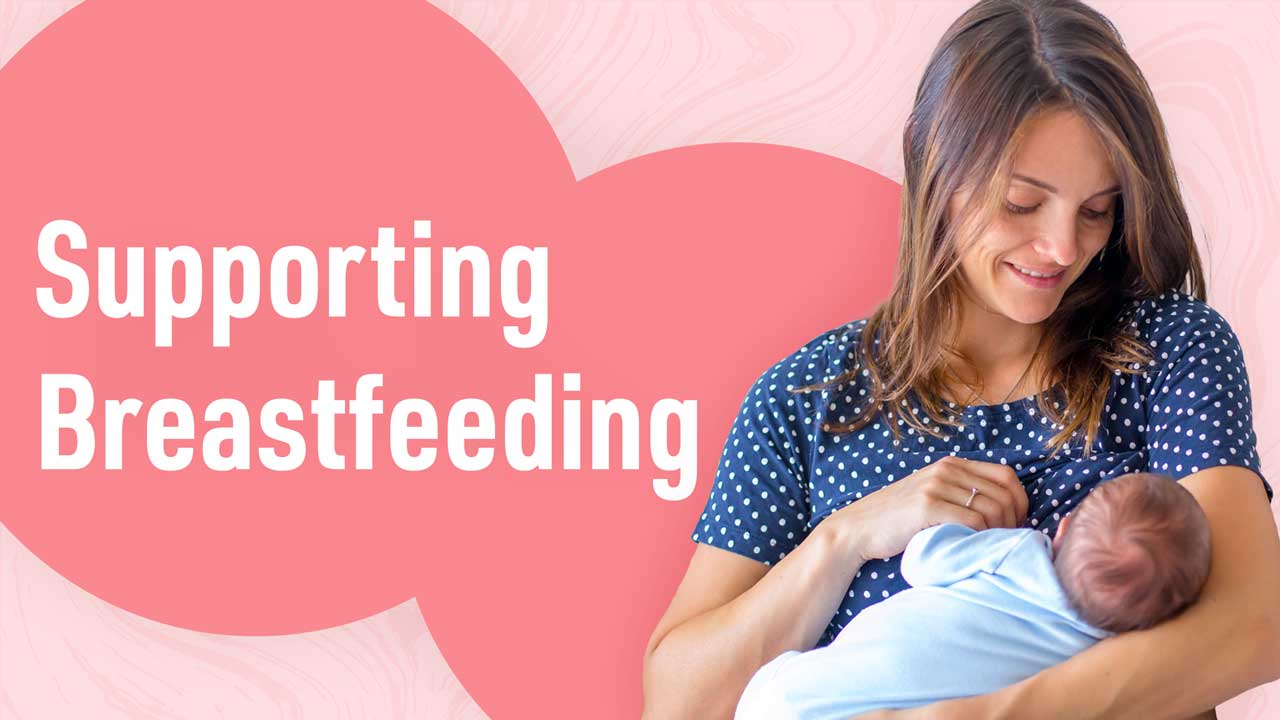The first few days following birth offer precious opportunities to help new parents establish confidence in breastfeeding.
Parents who have physical and emotional support during this period are known to be more successful and experience fewer difficulties (Hunter & Cattelona 2014).
They are also more likely to reach the suggested goal of exclusive breastfeeding for six months, as suggested by the World Health Organisation (2022).
Both WHO and UNICEF recommend:
- Initiation of breastfeeding within the first hour of life
- Exclusive breastfeeding, without any additional food or drink
- Breastfeeding on demand, as often as needed, day and night
- No use of bottles, teats or pacifiers.
(WHO 2022)
However, these are stringent requirements to meet. Failure to breastfeed can leave many birthing parents feeling inadequate and midwives wondering what more they could have done.
So, how can parents be helped to breastfeed for as long as possible?

Providing Support is Key to Success
Despite recommendations that babies are exclusively breastfed for the first six months of life, a poll conducted by the Royal College of Midwives revealed that 43% of birthing parents surveyed did not feel as though they were given enough support and guidance to help them do so (The Press Association 2014).
Meanwhile, a separate poll of 2,000 midwives revealed that:
- 57% ‘would like to do more’ to provide infant feeding support and help parents
- 25% felt that there was not enough time or resources to support new parents with important aspects of breastfeeding, such as latching-on and correct positioning.
(The Press Association 2014)
In the view of the Baby Friendly Initiative (2017), support needs to be offered for the whole journey from pregnancy to new parenthood and not just for the first few days postnatally.
Sensitive conversations during pregnancy, skilled help after birth, ongoing guidance and social support are all needed to enable parents to feel confident and breastfeed successfully (Baby Friendly Initiative 2017).
For support to be effective, it needs to be:
- Mother-centred
- Face-to-face
- Ongoing
- Predictable
- Non-judgemental.
(Baby Friendly Initiative 2017)
Maycock et al. (2013) also raise an important point suggesting that although studies have identified numerous factors affecting breastfeeding, including maternal education; mode of delivery; birth weight; and socioeconomic status, it’s support from the non-birthing parent that often plays a crucial role in the success of breastfeeding.
The Role of Non-Birthing Parents During Breastfeeding
Research shows that non-birthing parents can have a considerable influence on the other parent’s decision to initiate and continue with breastfeeding.
Despite this, many midwives fail to engage with non-birthing parents in supporting breastfeeding.
A study by Hunter and Cattelona (2014) found that first-time mothers who identified as having support from the infant’s father during the early postpartum period were more likely to initiate breastfeeding and had longer breastfeeding durations.
Although high-quality research remains relatively sparse in this area, Sherriff, Hall and Panton (2014) suggest that five main factors influence a non-birthing parent’s role in breastfeeding support:
- Knowledge about breastfeeding
- Positive attitude to breastfeeding
- Involvement in the decision-making process
- Practical support
- Emotional support.

As Brown and Davies (2014) comment, the more the non-birthing parent feels included, the better the outcome. It’s a view backed up by Sherriff and Hall (2011), who suggest that non-birthing parents are potentially the missing part of the jigsaw in terms of breastfeeding support.
That said, there is still relatively little research exploring the non-birthing parent’s role and, more importantly, the information and guidance they may need.
As Brown and Davies (2014) suggest, there is room for improvement here in the ways maternity staff embrace the non-birthing parent’s role, as many feel excluded from antenatal classes and breastfeeding education.
Key Messages for Improvements in Practice Include:
- Non-birthing parents want to be involved and support their partners in breastfeeding, but many feel left out and helpless.
- Non-birthing parents want specific and accessible information about the benefits of breastfeeding as well as strategies to encourage and support their partner.
- Non-birthing parents also need support during this time.
- Health professionals must involve, include and support non-birthing parents, recognising their importance in the breastfeeding relationship.
Practical Support, or Emotional Support - Which is Best?
Interestingly, Emmott and Mace (2015) discovered that practical support from fathers and grandmothers is associated with lower levels of breastfeeding, as it may incentivise formula feeding.
In contrast, however, the non-birthing parent’s presence and emotional support are associated with more successful breastfeeding. This suggests that practical support and emotional support function differently, and that practical support may not always be as welcome or useful as previously thought.
Rempel et al. (2016) also report on two studies examining the relationships between fathers’ perceptions of their breastfeeding support and the mothers' perceptions of the support they received.
Interestingly, mothers' intended breastfeeding duration was shorter when fathers wanted them to continue for a long time and when they were more appreciative and knowledgeable about breastfeeding.
Likewise, when fathers reported being more appreciative and directly involved, mothers breastfed for a shorter duration.
In both these studies, mothers' perceptions of their partners' responsiveness and fathers' reports of their own responsiveness predicted that breastfeeding would continue for longer than it actually did in practice.
These findings suggest that the most effective breastfeeding support is provided using a sensitive, coordinated teamwork approach that is always responsive and adaptable to the breastfeeding parent’s needs.
Technical Expert or Skilled Companion?

The theme of technical expert versus skilled companion also extends into the role of the midwife.
As Swerts et al. (2016) suggest, midwives value breastfeeding education and breastfeeding support as a significant part of their role. However, the way in which a midwife approaches and supports the breastfeeding parent can be broadly classified into two distinct approaches:
- The midwife as a technical expert. Here, the support is mainly breast-centred, focuses on techniques, uses a ‘hands-on’ approach and sees the patient as a novice.
- The midwife as a skilled companion. Here, the midwife is patient-centred, focuses on the parent-baby relationship and uses a ‘hands-off’ approach during breastfeeding support.
Most midwives seem to naturally favour the hands-off role of being a skilled companion, but working in a busy hospital setting doesn’t always support this, leaving most limited to the role of technical expert (Swerts et al. 2016).
Perhaps then, in the light of these studies, there is room for both midwives and non-breastfeeding parents to embrace the softer role of skilled companion, rather than a ‘hands-on’ expert.
Certainly, there is room for a more inclusive and innovative approach to a non-breastfeeding parent’s influence, from early thoughts on breastfeeding through to established feeding and eventual weaning.
Topics
References
- Baby Friendly Initiative 2017, Blog: Supporting Breastfeeding: We Know What Works; Let's Make it Happen, UNICEF, viewed 16 January 2023, https://www.unicef.org.uk/babyfriendly/supporting-breastfeeding-make-it-happen/
- Brown, A & Davies, R 2014, ‘Fathers' Experiences of Supporting Breastfeeding: Challenges for Breastfeeding Promotion and Education’, Maternal & Child Nutrition, vol. 10, no. 4, viewed 16 January 2023, https://www.ncbi.nlm.nih.gov/pmc/articles/PMC4282396/
- Emmott, E 7 Mace, R 2015, ‘Practical Support from Fathers and Grandmothers Is Associated with Lower Levels of Breastfeeding in the UK Millennium Cohort Study’, PLOS ONE, vol. 10, no. 7, viewed 16 January 2023, https://journals.plos.org/plosone/article?id=10.1371/journal.pone.0133547
- Hunter, T & Cattelona, G 2014, ‘Breastfeeding Initiation and Duration in First-Time Mothers: Exploring the Impact of Father Involvement in the Early Post-Partum Period’, Health Promot Perspect., vol. 2, no. 4, viewed 16 January 2023, https://www.ncbi.nlm.nih.gov/pmc/articles/PMC4300437/
- Maycock, B et al. 2013, ‘Education and Support for Fathers Improves Breastfeeding Rates’, Journal of Human Lactation, vol. 29, no. 4, viewed 16 January 2023, https://journals.sagepub.com/doi/abs/10.1177/0890334413484387
- The Press Association 2014, ‘RCM Poll Finds Information on Breastfeeding ‘Lacking’’, Nursing Times, 23 May, viewed 16 January 2023, https://www.nursingtimes.net/roles/midwives-and-neonatal-nurses/rcm-poll-finds-information-on-breastfeeding-lacking-23-05-2014/
- Rempel, L, Rempel, J & Moore, K 2016, ‘Relationships Between Types of Father Breastfeeding Support and Breastfeeding Outcomes’, Maternal & Child Nutrition, vol. 13, no. 3, viewed 16 January 2023, https://onlinelibrary.wiley.com/doi/full/10.1111/mcn.12337
- Sherriff, N, Hall, V & Panton, C 2014, 'Engaging and Supporting Fathers to Promote Breast Feeding: A Concept Analysis', Midwifery, vol. 30, no. 6, viewed 16 January 2023, https://www.ncbi.nlm.nih.gov/pubmed/23958385
- Sherriff, N & Hall, V 2011, 'Engaging and Supporting Fathers to Promote Breastfeeding: A New Role for Health Visitors?', Scandinavian Journal of Caring Sciences, vol. 25, no. 3, viewed 16 January 2023, https://www.ncbi.nlm.nih.gov/pubmed/21223346
- Swerts, M, Westhof, E, Bogaerts, A & Lemiengre, J 2016, 'Supporting Breast-Feeding Women From the Perspective of the Midwife: A Systematic Review of the Literature', Midwifery, vol. 37, viewed 16 January 2023, https://www.sciencedirect.com/science/article/abs/pii/S0266613816000541
- World Health Organisation 2022, Breastfeeding, WHO, viewed 16 January 2023, https://www.who.int/health-topics/breastfeeding#tab=tab_1
 New
New 
